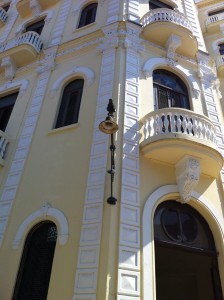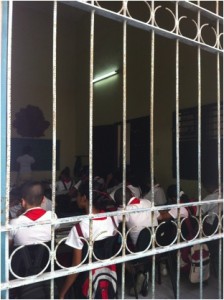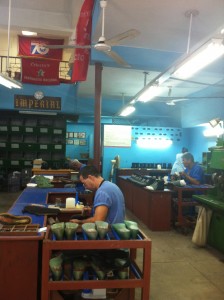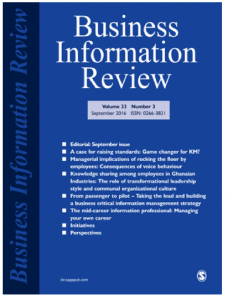By marrying mid March my wife and I inadvertently chose a time when others focus on the impending Easter holidays and children are in school, timing which has proved advantageous in realizing our ambition to try and take our main holiday around our anniversary. Neither of us are really sun lounger lovers, we have low boredom thresholds and eschew the type of small talk and hail fellow well met types often associated with a resort located in an isolated spot.
Jibacoa: an idyllic place to unwind
Jibacoa with an exceptional coral reef off the beach and free water sports yet only 75 minutes from Habana, Cuba seemed to offer the perfect wind down and fascinating capital city combination. 
And so it was to prove though not in the way either of us had expected. If you are interested to read more about the resort my review is on Trip Advsor: click here. Would I recommend this – yes without hesitation with caveats mentioned in the review.
The build up to the trip, booked 9 months previously, had been somewhat chaotic. We’d relocated to Meads Village, Eastbourne in February and were taking time to come to terms with leaving Lewes where we’d spent a very happy 5 years. I’d just returned from to Khartoum running workshops to look at how the health industry might make better use of its and others’ knowledge. The day before we were to depart I had been in London kicking off an important piece of work for HMRC and Ana was but 2 months into a new job. In short we were in need of a bit of r & r.
Virgin, visas and when 5 names is too many
10 days prior to departure I discovered via Trip Advisor that we needed visas to enter Cuba and that as independent travelers were on the hook to obtain them ourselves. The advice from Virgin Atlantic (our carrier) was unhelpful: ‘we don’t arrange them but there are companies who do’. Yes for £90! Fortunately Virgin Holidays (through whom I’d booked accommodation – same name but a very different company), were much more helpful. £15 was added to our invoice and blank visas arrived a few days later. And for good measure after an email exchange the local representative had sorted transport to and from the resort.
We checked in online on seats 80D & 80H (Upper Deck on the 747-400 is a mix of Premium Economy and Economy and more like a small cabin). Arriving at bag drop we encounter a small issue. Please bear with me this gets complicated and has a Cuban twist at the end. My wife’s actual name (that appearing on our wedding certificate) is Ana Luisa Madeira Aguilar-Corney. Her Portuguese passport (for global travel) omits the name Corney whereas her citizen card (OK for EU travel) is more straightforward and does not.
I’d booked her in the name of Aguilar as I usually do but Virgin Atlantic’s bag drop representative decided that was wrong and Ana could not travel in that name. After my terse exchange and harrumphing had made the situation more intractable, Ana intervened and worked out a solution. A new ticket would be issued (free) in the surname of Madeira Aguilar and off she went with the Virgin representative to arrange it. A slightly delayed flight did not lessen our anticipation of 11 days of blue skies, warm sun, good food and a fascinating culture.
surviving on £18 a month
Cuba is one of the few remaining states that maintain a centralized structure. It’s ‘contract’ with its people: in return for free education, health, heat, power and financial support (less than £20 per month) to a minimum subsistence level, the state has the right to deploy its citizens as it thinks fit and to decide where state funds are allocated. 
So Cuban doctors and teachers can be found in Venezuela, Pakistan and a host of African countries as a quid pro quo for the supply to the Cuban state of commodities such as oil and gas. And it has a thriving pharma industry, is strong agriculturally and thrives on its national obsessions, Baseball and Basketball.
It has placed a safety net under its citizens who are being allowed a degree of latitude, owning properties and businesses and making money where they can. And the Cuban is nothing if not imaginative when it comes to ways of making ‘CUCs’ (local acronym for convertible pesos which has parity with the US$ and is worth about 24 times the Peso, the currency used extensively by the indigenous population) from tourists.
Tipping is not permitted but is one of the few ways to augment the meager salaries (CUC25 per month) applied uniformly to every profession. In this bastion of socialism there is little financial benefit to be had from being a doctor, a teacher or a lawyer. Ania our guide had graduated as a lawyer was teaching at university but made most of her money from tips taking tourists from the resorts into Habana. Toilet attendants charge for toilet paper (there is a shortage of many basic commodities we take for granted).
a crumbling infrastructure struggling to cope with the digital age
I digress. The impre ssion is of a country where the fabric and infrastructure is held together by sellotape and its not uncommon to see trees growing in buildings.
ssion is of a country where the fabric and infrastructure is held together by sellotape and its not uncommon to see trees growing in buildings.
Like most centrally run economies every opportunity is taken to make its bureaucracy felt (to get on a state run train you have to arrive early for ‘check in’ and buying a ticket is a minefield requiring an intimate knowledge of the train formation – one window for carriages 1-4, another for 5-8 etc) yet it feels safe and there is little evidence of the military or the police other than at wayside checks for speeding motorists.
The transport system is in decline. While it is possible to travel by train from Habana (at the North end of the island) to the South the journey takes anything from 12 hours to a day! Buses & coaches are the mainst ay and a combination of old and new. The car pool will delight petrol heads. From mid 50’s US icons (Chevys /Cadillacs /Oldsmobile’s) to 70’s Soviet boxes (Ladas/Muscovites) to the odd newish Asian (Mazda/KIA) interspersed with rickshaw style pedal and motorised ‘taxis’ of the type you’d find in Mumbai or Khartoum. Despite the appearance many of the classic cars have reconditioned diesel engines which spew out vast quantities of pollution. The taxi drivers are rightly proud of their ability to barter parts and manufacture workarounds to keep their vehicles on the road.
ay and a combination of old and new. The car pool will delight petrol heads. From mid 50’s US icons (Chevys /Cadillacs /Oldsmobile’s) to 70’s Soviet boxes (Ladas/Muscovites) to the odd newish Asian (Mazda/KIA) interspersed with rickshaw style pedal and motorised ‘taxis’ of the type you’d find in Mumbai or Khartoum. Despite the appearance many of the classic cars have reconditioned diesel engines which spew out vast quantities of pollution. The taxi drivers are rightly proud of their ability to barter parts and manufacture workarounds to keep their vehicles on the road.
 The architecture is priceless but crumbling (Central Habana is a gem or will be if it ever gets fully renovated). Everywhere you go there is something to look at and its easy to see why UNESCO is funding the gradual restoration of the capital.
The architecture is priceless but crumbling (Central Habana is a gem or will be if it ever gets fully renovated). Everywhere you go there is something to look at and its easy to see why UNESCO is funding the gradual restoration of the capital.
The Internet revolution is passing Cuba by due to lack of effective access. Whether this is deliberate I know not but productivity is low and frustrations immense – it felt like going back 10 years pre wireless – and one of the perverse pleasures was to pass the Internet room at the resort and listen to the expletives from users trying to perform simple tasks like flight check in only for their money to run out as the page loads.
Most have mobiles and many of its young citizens have Facebook accounts but are severely constrained by the lack of access to the Internet anywhere other than at the slow dial up outlets where there is always a queue and which charge a fortune £5 per hour.
 School children are well dressed (a feature of the Caribbean) and polite and everywhere people’s default reaction is a smile. The young aspire to leave and are influenced not by social media but what they see on TV. London 2012 made a huge impact and union jack attire was ubiquitous.
School children are well dressed (a feature of the Caribbean) and polite and everywhere people’s default reaction is a smile. The young aspire to leave and are influenced not by social media but what they see on TV. London 2012 made a huge impact and union jack attire was ubiquitous. 
an eclectic population
Cuba’s citizens are a mixture of all those who have settled there. African, Indian, South American, Russian and now Chinese. Clothing ranges from ragged to chic; hairstyles are eclectic and of all colours. It is a country that is on the surface devoid of racism and homophobia.

Take a wander around the city and you will see all manner of sights sounds and smells. 


Yet there is an aspect of Cuban society we found reminiscent of South Africa during apartheid. Cubans are banned from hotels unless they are staying in them. Our guide, Ania (a lawyer as I said earlier) was prohibited from joining us for dinner or from coming to our suite despite the fact we were paying guests. It must breed a sense of resentment.
‘authentic Cuban cuisine in a great setting’
Finally the food. People say don’t go there for the food. Well on our final night we ate at a restaurant Asturias Bar which was great – here’s my review on Trip Advisor

when Cuba, Portugal and Spain come together
The sting in the tail? We discovered when Ana gave Ania a card that Aguilar is in fact one of the most popular surnames in Cuba dating back to the time when the Spanish controlled the island. There are also Aguilars in Chile (indeed Felipe is a famous golfer on the tour) and some in Colombia. Ana has never quite understood the Spanish link since to the best of her knowledge her father whose name she bears rarely went there and his ancestors were born and bred in central Portugal.
Finally as if to confirm the Cuban/Portuguese link Ania’s boyfriend who is Cuban has taken Portuguese citizenship and now lives in Lisboa and sells Cuban cigars!
 So yesterday having recently confirmed my participation in KM Asia 2017 and booked a flight from Hong Kong to Kuala Lumpur on AirAsia I decided to comment on a previous flight.
So yesterday having recently confirmed my participation in KM Asia 2017 and booked a flight from Hong Kong to Kuala Lumpur on AirAsia I decided to comment on a previous flight. To my surprise having typed in Air Asia into Trip Advisor’s search box I got this set of drop down choices. It made no sense so I emailed them:
To my surprise having typed in Air Asia into Trip Advisor’s search box I got this set of drop down choices. It made no sense so I emailed them:
 The following article was published in Business Information Review Magazine.Summary
The following article was published in Business Information Review Magazine.Summary












